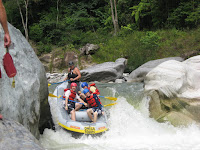 I stole the title of this post from an excellent article on "Why Chinese Is So Damn Hard" by David Moser. My favorite excerpt:
I stole the title of this post from an excellent article on "Why Chinese Is So Damn Hard" by David Moser. My favorite excerpt:Having never studied a day of Spanish, I could read a Spanish newspaper more easily than I could a Chinese newspaper after more than three years of studying Chinese.I can confirm Moser's thesis: Chinese is damn hard. Personally, my spoken is far ahead of my written, which suits me. In business or foreign policy, I might often speak Chinese, sometimes read, but rarely type, and almost never hand-write characters. My Chinese friends likewise painstakingly learned the latter (they had class six-days-a-week from 6am-10pm during junior and high school), but they seldomly hand-write nowadays: my Luxembourgian friend Chloe corrected my Chinese language partner Anna on the character for monkey the other day.
Classroom instruction is traditionally Chinese. I lucked out and have all cheerful teachers. Duan Laoshi makes us sing if we come late; you all missed a soulful rendering of “A Whole New World,” by yours truly when I overslept one morning. Yet even my engaging teachers are constrained by the system: the teacher talks and the students cower, hoping not to be called upon. I even fell into that trap myself for a while, but snapped out of it and am now that obnoxius kid who talks all the time. Average class size is about 20 students. Desks are aligned facing the teacher, not in a circle like at Stanford. It's fine for reading and writing comprehension, but is no good for my spoken Chinese.
One textbook, used at the University of Leeds, offers an easy guide to the pronounciation of consonants:
It is an unaspirated voiceless bilabial plosive which is produced by pressing the lips together, keeping the breath in the mouth, and then opening the mouth to let the air out with a pop.Matt writes, “Simple really, even if some of these sound more complicated than yoga movements and could be mistaken for oral sex instructions.”
This is a voiceless labio-dental fricative which is produced by placing the lower lip against the upper teeth and releasing the breath with a friction.
We all develop our coping strategies. Because of the tones, my
 friend Emily views it as a 3-d language when all we knew before was 2-d. At a 麻辣汤 (spicy soup) shop in Nanjing she once ordered a soup as "点点点点点 spicy," 点 being Chinese for "a little bit." In Chinese, however, this means "a little spice, a little more, a little more, a little more, and a little more... " Your mouth burns as you eat your spicy soup, you laugh it off, and try again. My friend Henrik has a rule: if it’s over 10 strokes, don’t bother. I personally, when out and about, routinely keep short lists in my mind of words to look up when I get back. One early list was "Hard Dark Guess," which is also what I will name my rock band when I’m reincarnated with rhythm one day. With English, German, Spanish, and Chinese, I don't intend to attempt anymore languages in my life. Maintenance alone will be a tall order.
friend Emily views it as a 3-d language when all we knew before was 2-d. At a 麻辣汤 (spicy soup) shop in Nanjing she once ordered a soup as "点点点点点 spicy," 点 being Chinese for "a little bit." In Chinese, however, this means "a little spice, a little more, a little more, a little more, and a little more... " Your mouth burns as you eat your spicy soup, you laugh it off, and try again. My friend Henrik has a rule: if it’s over 10 strokes, don’t bother. I personally, when out and about, routinely keep short lists in my mind of words to look up when I get back. One early list was "Hard Dark Guess," which is also what I will name my rock band when I’m reincarnated with rhythm one day. With English, German, Spanish, and Chinese, I don't intend to attempt anymore languages in my life. Maintenance alone will be a tall order.A Chinese-American friend of mine jokes with her boyfriend, “If you want me to convert to Judaism, you have to learn Chinese.” That's committment--my father never even learned German.









































